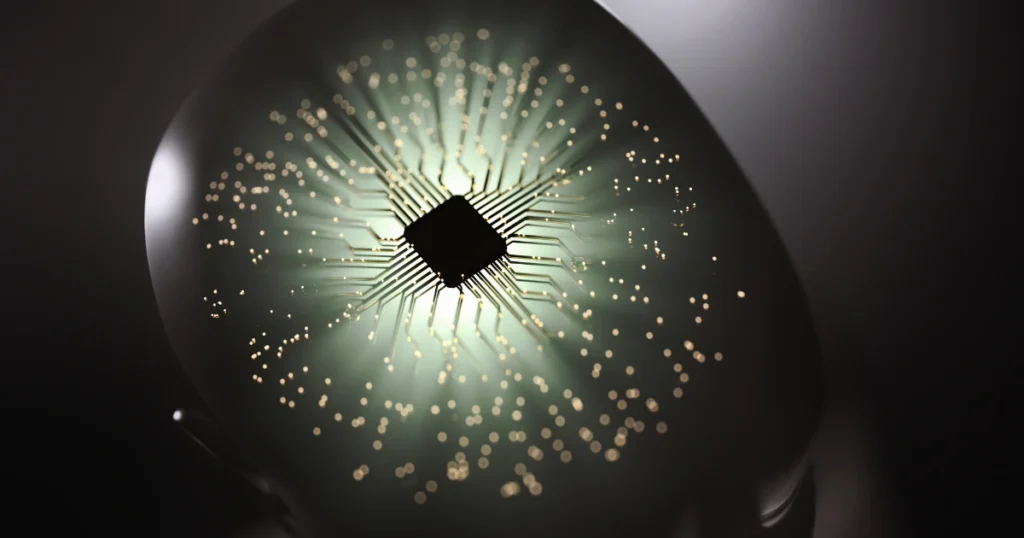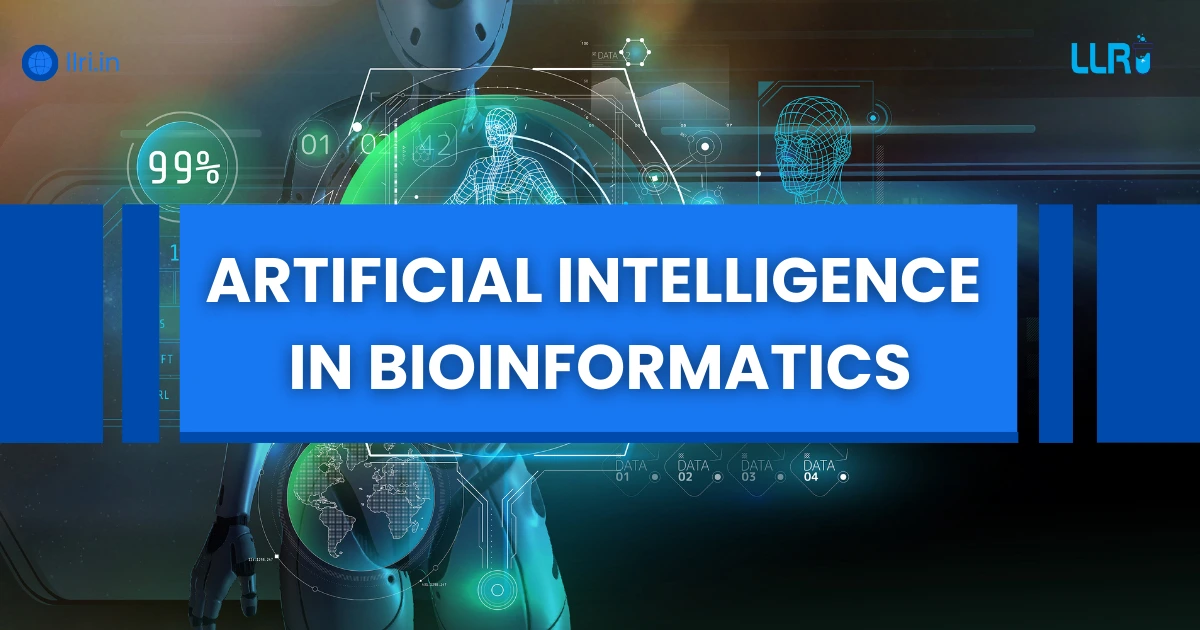Artificial Intelligence in Bioinformatics: The fusion of artificial intelligence and bioinformatics is not just an emerging trend; it’s becoming the backbone of modern scientific discoveries.
From decoding DNA sequences to predicting protein structures, the applications are vast. But before we learn more about it, let’s ask a fundamental question: what is artificial intelligence in bioinformatics?
In simple terms, it’s the use of AI-driven algorithms and computational models to analyse and interpret biological data. Since bioinformatics deals with huge datasets – from genetic information to molecular structures, AI brings speed, accuracy, and predictive power that traditional methods often struggle with.
What is Artificial Intelligence in Bioinformatics?
Artificial intelligence refers to machines or systems that can mimic human intelligence, learning, reasoning, and problem-solving. In bioinformatics, this means AI can help decode DNA sequences, study mutations, and even predict diseases.
For instance:
- AI models can scan through millions of gene sequences in minutes.
- Machine learning algorithms can spot hidden patterns that human researchers might miss.
- Deep learning can predict protein folding, an area that once seemed unsolvable.
So, when we ask, what is artificial intelligence in bioinformatics, the answer is clear: it’s the application of smart computational tools to make sense of biological data at lightning speed.

Importance of Artificial Intelligence in Bioinformatics
Now, why does this matter? The importance of artificial intelligence in bioinformatics lies in its ability to transform healthcare, agriculture, and research.
- Drug Discovery and Development
Developing a drug used to take years. With AI, simulations and predictive models cut this time drastically. AI helps identify which molecules might become successful drugs even before lab testing. - Personalised Medicine
Every individual’s genetic makeup is unique. AI analyses this genetic data to recommend personalised treatment plans. This is already being used in cancer therapies where treatments are matched with patients’ DNA profiles. - Genomic Research
AI speeds up genome sequencing, making it easier to study hereditary diseases. It helps identify variations in DNA that are linked to specific disorders. - Data Management
Bioinformatics involves handling massive datasets. Without AI, it would be impossible to process or interpret them effectively.
When we speak of the importance of artificial intelligence in bioinformatics, it’s about precision, speed, and innovation. Simply put, AI makes the impossible possible.
Types of Artificial Intelligence in Bioinformatics
Bioinformatics makes use of several types of AI. Let’s break them down:
- Machine Learning (ML)
ML algorithms learn from past data and improve predictions. For example, ML helps predict how a specific gene mutation might lead to a disease. - Deep Learning (DL)
A subset of ML, deep learning uses neural networks to tackle highly complex problems. Protein structure prediction, a major breakthrough in bioinformatics is largely driven by deep learning. - Natural Language Processing (NLP)
Research papers, medical records, and biological texts are vast. NLP scans and interprets this unstructured text, making it easier for scientists to access hidden insights. - Expert Systems
These simulate the decision-making ability of human experts. In bioinformatics, expert systems can guide scientists in choosing the right sequencing methods or analysis techniques. - Robotics and Automation
While not purely computational, robotics powered by AI helps in automating lab experiments, making data collection faster and error-free.
So, when we discuss the types of artificial intelligence in bioinformatics, we’re essentially talking about tools that make bioinformatics more accurate, efficient, and futuristic.

AI & Bioinformatics: Where is it used?
The use of AI in bioinformatics isn’t just theoretical, it’s happening right now:
- COVID-19 Research: AI helped map the virus structure quickly, enabling vaccine development at record speed.
- Agricultural Bioinformatics: AI-driven genetic studies are being used to create disease-resistant crops in India.
- Cancer Genomics: AI models are predicting tumour growth patterns, assisting doctors in designing effective treatments.
As the applications grow, so do the opportunities for learners and professionals who want to be part of this revolution.
Bioinformatics Courses in India
With AI reshaping bioinformatics, the demand for skilled professionals is skyrocketing. This is where structured learning comes into play. If you’re searching for a bioinformatics course in India, you’ll find multiple options, ranging from diplomas to advanced programs.
One standout is LLRI’s bioinformatics course offerings: Top Bioinformatics Institute in India
LLRI Diploma and Pro Advanced Programs
- Foundations of Bioinformatics
Basics of biological databases, sequence analysis, and computational methods. - Sequence Alignment and Phylogenetics
Learn how DNA and protein sequences are compared and how evolutionary relationships are drawn. - Molecular Biology Essentials and Sequencing Technologies
Covers the principles of sequencing and lab techniques crucial for AI-driven analysis. - Genomics and Advanced Analysis
Dive into genomics, large-scale data handling, and integration of AI tools. - Computational Skills and Data Analysis
A must-have for students, this module builds programming and analytical skills for AI applications. - Advanced Bioinformatics and Project Work
Hands-on projects ensure that learners not only understand theory but can apply it in practical settings.
For someone looking at a PG diploma in bioinformatics or a bioinformatics course in Bangalore, LLRI stands out as an institute of bioinformatics Bangalore that blends theoretical grounding with practical AI-based training.
Why Choose a Bioinformatics Course in Bangalore?
Bangalore, often called the “Silicon Valley of India,” is also a hub for biotechnology and life sciences. By enrolling in a bioinformatics course in Bangalore, students get exposure to:
- Industry partnerships
- Research collaborations
- Access to AI-driven labs and computational facilities
An institute of bioinformatics Bangalore like LLRI bridges the gap between classroom learning and industry demands.

Career Opportunities After a PG Diploma in Bioinformatics
Pursuing a PG diploma in bioinformatics opens up multiple career paths:
- Research Scientist in Genomics
- Clinical Data Analyst
- AI-driven Drug Discovery Specialist
- Computational Biologist
- Academic Research and Teaching Roles
As industries like healthcare, agriculture, and pharmaceuticals adopt AI, the demand for bioinformatics professionals is expected to rise exponentially in the coming years.
On A Final Note…
The journey of AI and bioinformatics is just beginning, but its potential is limitless. By now, you know what is artificial intelligence in bioinformatics, the importance of artificial intelligence in bioinformatics, and the various types of artificial intelligence in bioinformatics shaping research.
For students and professionals, investing in a bioinformatics course in India, especially a PG diploma in bioinformatics or a bioinformatics course in Bangalore, could be the stepping stone to a future-proof career. Institutes like LLRI in Bangalore provide not just academic learning but also practical exposure that today’s industries demand.
As science and AI grow hand in hand, the next big breakthrough could very well come from someone trained in these very classrooms.
FAQs
Q1. What is artificial intelligence in bioinformatics?
It is the application of AI tools like machine learning and deep learning to analyse biological data, such as genomes, proteins, and molecular interactions.
Q2. Why is artificial intelligence important in bioinformatics?
Because it makes data interpretation faster, more accurate, and enables discoveries in medicine, genomics, and agriculture that weren’t possible before.
Q3. What are the types of artificial intelligence in bioinformatics?
They include machine learning, deep learning, NLP, expert systems, and robotics applications in biological sciences.
Q4. Which is the best bioinformatics course in India?
LLRI offers comprehensive programs, including diplomas and advanced tracks, with modules tailored to the industry’s AI-driven needs.
Q5. Is Bangalore a good place to study bioinformatics?
Yes. With strong industry connections and research institutions, Bangalore is one of the best cities to pursue a bioinformatics course.

